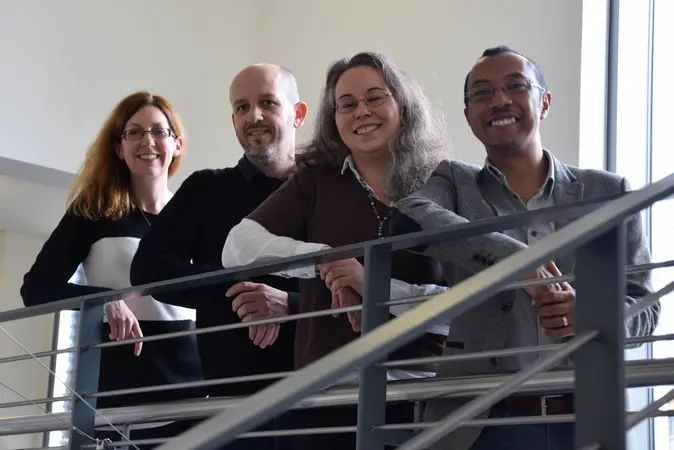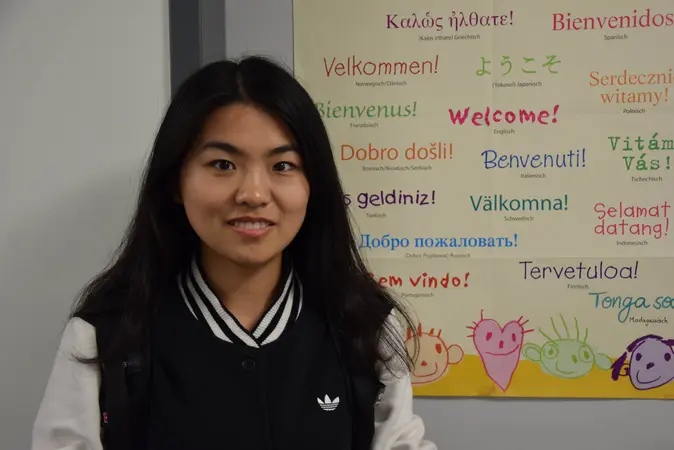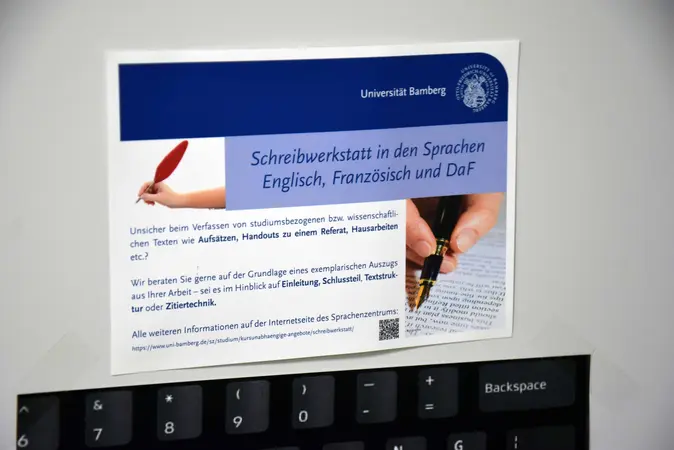Andriatiana Ranjakasoa advised Yunjing Ning on her master’s thesis.
Catherine Irvine, Donald Watson, Ulrike Friedrich and Andriatiana Ranjakasoa (from left) offer individual consultations and regular courses and workshops.
As a non-native German speaker, Yunjing Ning found the programme’s individual advice and assistance particularly valuable.
The Writing Centre’s offering at a glance: tips and assistance in all matters pertaining to academic writing.
Writing in a Foreign Language
Structuring texts well, satisfying academic standards, applying citing techniques correctly – none of these things is easy. That’s why the University of Bamberg Language Centre has been providing support for students writing academic papers. For example, the Language Centre is involved in the Lange Nacht der Studienarbeiten (an academic writing event affectionately referred to as “Write Night”): Since 2015, it has offered workshops for academic writing once a year together with the University Library, the Computing Centre, the Chair of Didactics of German Language and Literature, as well as the Chair of English Literary Studies. In February 2018, at the third Week of Young Research (Woche der jungen Forschung), the Language Centre was also represented by the workshop Writing Research English.
Writing Centre provides assistance with English, French and German as a foreign language
The Language Centre’s Writing Centre remains unknown to many students, but it’s been in operation since 2016. Lecturers assist students with their writing in English, French and German as a foreign language in a laid-back environment. Task types include exposés, essays, handouts, seminar papers or theses. “We originally started the Centre as an internationalisation programme for promoting early-career researchers by focusing on master’s and doctoral students. Our experience has shown that bachelor’s students have also profited from the Centre, and so we have expanded our offering,” explains Christine Drakew, Language Centre managing director and initiator of the Writing Centre programme.
Three tips for writing
The Writing Centre is built on three pillars. First, there are regular courses in which instructors give general tips on text production. Second, they provide workshops where they work directly with participants on their scholarly writing. Thirdly, instructors individually advise interested undergraduate and graduate students on the basis of personal text excerpts and drafts. Participants learn how they can formulate certain sections of their text such as the introduction or conclusion. Other points include sentence structure, word order and citation techniques.
“In general, we give three pieces of advice for drafting scholarly papers. Firstly, it’s important to establish a schedule and writing plan. Then, it’s important to formulate questions meant to be answered in the scope of the paper. And of course it’s important to make sure you have a comfortable working environment where you can get down to business,” explains Donald Watson, Language Centre lecturer of English courses in the Humanities Faculty and in IT-English. Along with Catherine Irvine, Ulrike Friedrich and Dr. Andriatiana Ranjakasoa, he is one of the Writing Centre’s go-to people.
The right time for office hours
There are many different times offered for consultation: those who require concrete structure from the beginning should make an appointment before they start writing their paper. Those who would like to go ahead and start writing can make an appointment for a later time. And as Christine Drakew adds, it’s always possible to have more than one appointment: “Above all, it’s important to us that we understand beforehand what the participants expect from our services and how exactly we can help.” For example, Yunjing Ning from China sent Andriatiana Ranjakasoa a five-page exposé of her master’s thesis. He discussed the structure of the text, grammar and bibliography with this student in the German Linguistics programme. “The professional assistance helped a great deal to advance my writing skills, since I am not a native German speaker,” she said in retrospect. “After all, my master’s thesis should be coherent and logical.” Andriatiana Ranjakasoa answered her questions before and during the writing process, but the scope of the Writing Centre’s services does not include spell-checking, content support and editing and correction of the completed master’s thesis.
Intensive publicity for the Writing Centre
As of now, mainly members of the Humanities faculty are making use of the assistance provided by the Language Centre. “We would like to increase promotion of the Writing Centre by systematically informing individual courses about our services,” says Christine Drakew. Donald Watson adds, “We are very pleased with the ever-growing number of interested students, especially those seeking assistance with English and German as a foreign language. Our programme is still being fleshed out, and we’d like to continue to expand our offering and tailor it to students’ needs.” The Centre’s four consultants meet regularly with students to discuss the programme and gather suggestions on how to adapt their services to participants’ individual needs. So if there is a high enough demand, it’s conceivable that the programme could also be expanded to include even more languages.
Upcoming Workshops offered by the Writing Centre include:
Speedreading: Monday, 11 June
Writing Research English: Friday, 22 June
Research Writing Retreat: Friday 29 June
For further details on these courses and other Writing Centre services, please visit the programme website at
![[Translate to 1 - english:] Sprachenzentrum Schreibwerkstatt: v.l.: Dr. Andriatiana Ranjakasoa; Yunjing Ning](/fileadmin/_processed_/a/2/csm_2018-04-13_Sprachenzentrum-Schreibwerkstatt__13__98d27376c7.webp)


